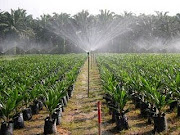TIMELY ACT FOR THE AUTHORITY. THESE CULPRITS MADE TONS OF MONEY AND DEMOLISH OUR OP BUSINESS IN FUTURE. ACT NOW OR PERISH LATER...
THE NST: Plugging the palm oil leak
By Ooi Tee ChingPublished: 2009/06/11
Malaysia plans to step up enforcement against oil palm seed scams and theft of palm fruits and oil, which are costing the country billions in lost revenues.
The Plantation Industries and Commodities Minister Tan Sri Bernard Dompok has told the Malaysian Palm Oil Board (MPOB) to buck up as these crimes have been going on for a long time.
"I want MPOB to step up enforcement immediately. All these oil palm seed scams and oil thefts must stop," he told Business Times in an interview in Putrajaya on Tuesday.
For a start, Dompok gave the green light to MPOB to licence palm oil transporters. This is allowed under the Malaysian Palm Oil Board Act 1998.
"I want to tighten up the loopholes. The transporters need to be licensed and we'll put in place a whistle-blowing scheme. Once MPOB board of directors give their consensus, it will come back to me for my signature and then we'll have it gazetted," Dompok said.
The companies will also have to install global positioning systems on their tankers to keep tabs of their movements. "Transporters must take responsibility for the actions of their drivers and pay the price if their tankers are involved in illegal activities," he said.
Under MPOB (Quality) Regulations 2005, whoever steals or contaminates crude palm oil can be fined up to RM250,000 or two years' jail or both.
In a separate interview, Palm Oil Refiners Association of Malaysia (Poram) acting chairman Yong Chin Fatt said refiners have suffered much from oil pilferage.
Refiners have no way of knowing whether the palm oil brought in by tankers are stolen or not.
"We're all established and we only accept oil that come in tankers, not in drums. These tankers come with the necessary documentation from the millers," he said.
"In fact, we incur additional costs when we're duped into buying contaminated cargo. We suspect such highly-organised crimes, that have spread to Sabah and Sarawak, are by syndicates. We appeal for more stringent enforcement," he added.
Dompok has also told MPOB to be more vigilant in stamping out oil palm seed scams.
"These scams have serious implications on the livelihood of thousands of smallholders and the country's average oil palm yield," he said.
It was recently reported that there are syndicates deceiving planters into buying low-yielding seeds that are not dura and psifera (DXP) crossbreds currently sold by the 19 genuine producers.
Last year, MPOB managed to seize 6.13 million fake DXP seeds and this amounted to RM11.35 million in opportunity loss for genuine producers.
However, the potential revenue loss runs into the billions in the long term as the fake seeds will not produce as much fruits.
Malaysia's oil palms are the most productive in the world because of government policy to use high-yielding crossbred seeds of the mother palms of the DXP strains.
Regular seeds from existing oil palm trees will only yield five to 10 tonnes of fresh fruit bunches in a year compared with 25 tonnes for DXP seeds.
Cross breeding of high-yielding DXP seeds takes time and the seeds are sold for RM2 each.
Subscribe to:
Post Comments (Atom)


No comments:
Post a Comment